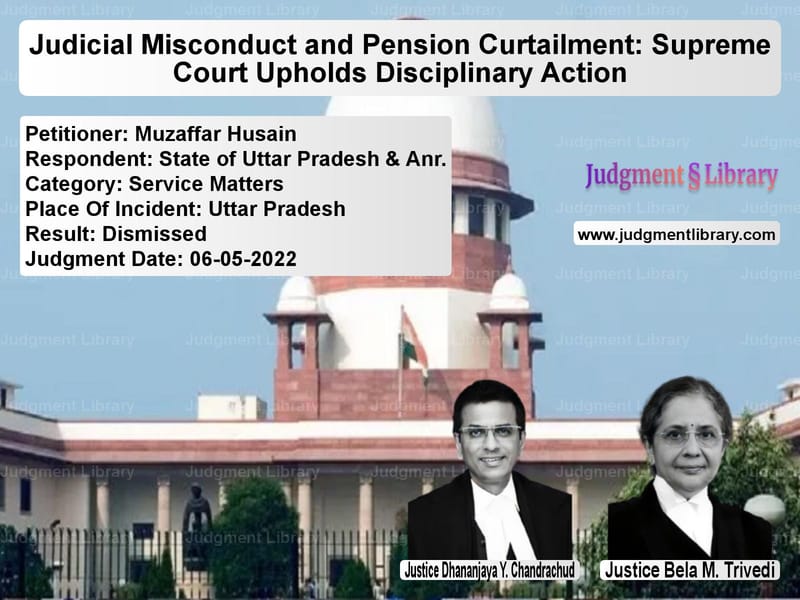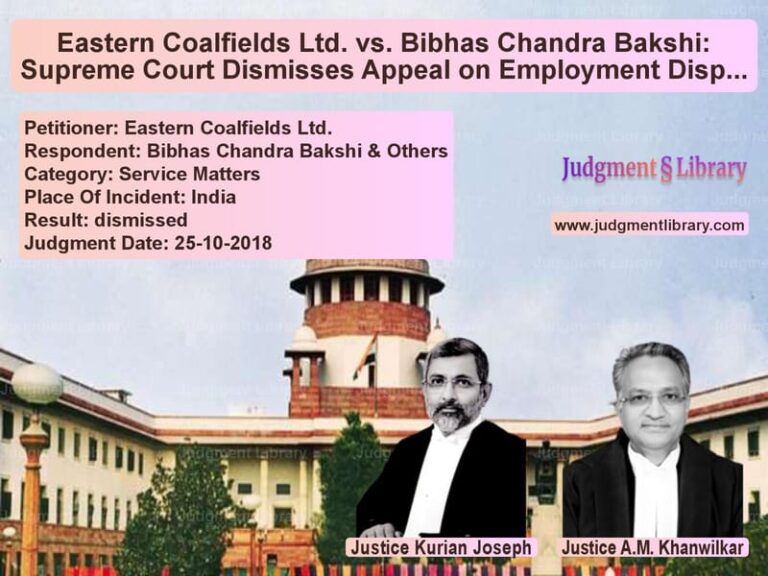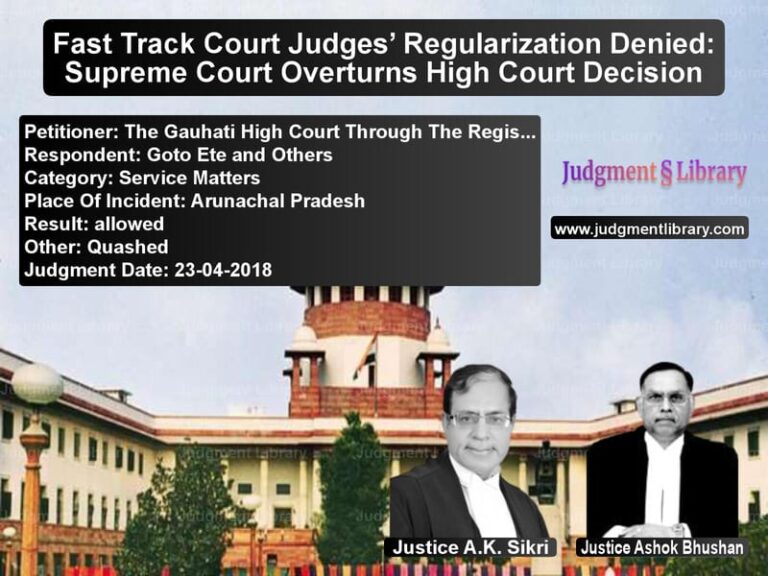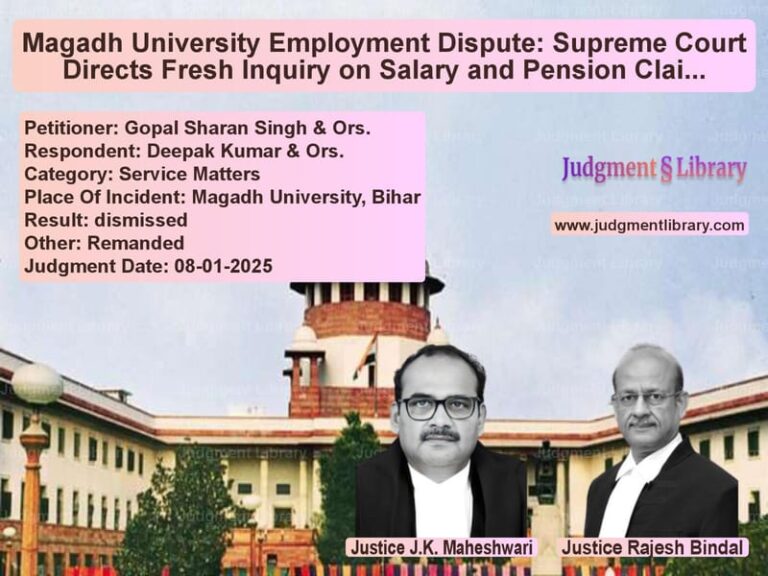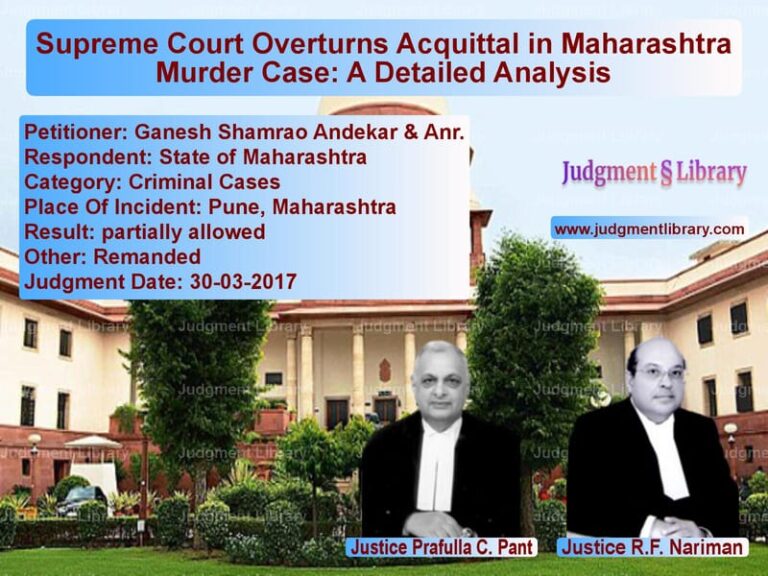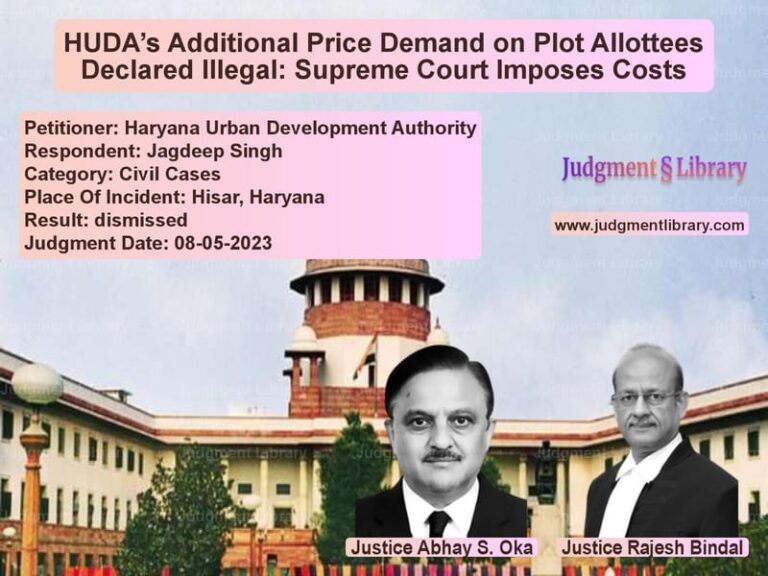Judicial Misconduct and Pension Curtailment: Supreme Court Upholds Disciplinary Action
The Supreme Court of India recently delivered a critical judgment in the case of Muzaffar Husain vs. State of Uttar Pradesh & Anr.. This case revolved around allegations of misconduct by a judicial officer and the subsequent disciplinary action that led to a 90% curtailment of his pension. The Court’s decision reaffirmed the principles of judicial accountability, the necessity of integrity among judicial officers, and the limits of judicial review in disciplinary actions.
Background of the Case
The appellant, Muzaffar Husain, had joined the Uttar Pradesh Judicial Services in 1978 and later sought voluntary retirement in September 2003. After retirement, he served as a Judicial Member at the Central Administrative Tribunal (CAT), Mumbai Bench. However, in 2005, a departmental inquiry was initiated against him concerning his conduct while serving as the 11th Additional District Judge in Agra from May 2001 to May 2003.
The charges centered on his decisions in land acquisition cases, where he allegedly awarded excessive compensation to subsequent purchasers of acquired lands. The inquiry accused him of judicial impropriety, breach of integrity, and favoritism. The Full Court of the Allahabad High Court accepted the findings of the inquiry and recommended a 90% reduction in his pension, which was later modified to 70% by the High Court.
Read also: https://judgmentlibrary.com/bihar-2-lecturers-merger-with-bes-supreme-court-verdict-explained/
Key Legal Issues Before the Supreme Court
- Whether the disciplinary proceedings against the appellant were conducted fairly.
- Whether a judicial officer’s decisions could be grounds for disciplinary action in the absence of direct allegations of corruption.
- Whether curtailment of pension was justified based on the charges proved against the appellant.
- The scope of judicial review in disciplinary matters concerning judicial officers.
Arguments Presented
Petitioner’s (Muzaffar Husain) Arguments
- The inquiry was initiated without any pending complaint against him and was based solely on a judicial review of his past decisions.
- None of his orders had been set aside due to misconduct or lack of legal standing in higher courts.
- The allegations did not include any charge of bribery or corruption, making the punishment excessively harsh.
- Many of the cases he decided were upheld by the High Court, demonstrating that his decisions were legally sound.
- The curtailment of pension was arbitrary and disproportionate.
Respondent’s (State of Uttar Pradesh) Arguments
- The inquiry followed due process and found the appellant guilty of judicial impropriety by awarding excessive compensation in land acquisition cases.
- His actions benefited subsequent purchasers, who had no legal right to claim enhanced compensation.
- Even if bribery was not proven, judicial officers must maintain the highest standards of integrity, and failure to do so warrants disciplinary action.
- The Allahabad High Court had acted within its constitutional authority under Article 235 in controlling its judicial officers.
- Since the appellant’s conduct shook the collective conscience of the Full Court, disciplinary action was justified.
Supreme Court’s Observations and Ruling
1. Integrity of Judicial Officers
The Supreme Court reaffirmed that judicial officers must maintain high ethical and legal standards. The Court observed:
“Judicial office is a public trust. Any conduct that undermines public confidence in judicial integrity is a serious matter.”
2. Scope of Disciplinary Action Against Judges
The Court clarified that while judges have judicial independence, their actions are subject to disciplinary review when they exhibit recklessness, favoritism, or clear deviation from legal principles. It cited previous rulings stating that a judge’s conduct must be above suspicion.
3. Judicial Review in Disciplinary Cases
The Court emphasized that judicial review in such cases is limited and should focus on whether the inquiry process was fair and whether the punishment was proportional. It ruled that the appellant’s actions justified a significant reduction in pension benefits.
4. No Justification for Reducing Pension Curtailment Further
The Supreme Court found that the High Court had already exercised leniency by reducing the pension cut from 90% to 70%. It refused to further intervene, stating:
“There is no merit in the present appeal. The findings of the Full Court are based on evidence, and the punishment imposed is proportionate.”
Impact of the Judgment
The Supreme Court’s ruling has significant implications:
1. Strengthening Judicial Accountability
The ruling sets a strong precedent for disciplinary action against judicial officers who fail to uphold integrity in their decisions. It establishes that even in the absence of proven corruption, reckless judicial conduct can warrant strict penalties.
2. Protection of Pension Rights with Limits
The judgment balances the rights of retired judicial officers by ensuring that pension benefits are not withheld arbitrarily but also affirming that misconduct can lead to significant reductions.
3. Limited Scope of Judicial Review
The ruling clarifies that courts should not interfere with disciplinary actions unless there is a clear violation of natural justice or statutory rules.
4. Preventing Abuse of Judicial Discretion
By upholding the disciplinary action, the Court sends a strong message against judicial officers who misuse discretion for undue favors in their rulings.
Conclusion
The Supreme Court’s decision in Muzaffar Husain vs. State of Uttar Pradesh & Anr. is a landmark ruling on judicial accountability and disciplinary proceedings. By upholding the curtailment of pension benefits, the Court has reinforced the principle that judicial officers are not immune to disciplinary action for misconduct, even if no corruption is proven. This case serves as a reminder that judicial integrity is paramount, and deviations from ethical standards will not be tolerated.
Petitioner Name: Muzaffar Husain.Respondent Name: State of Uttar Pradesh & Anr..Judgment By: Justice Dhananjaya Y. Chandrachud, Justice Bela M. Trivedi.Place Of Incident: Uttar Pradesh.Judgment Date: 06-05-2022.
Don’t miss out on the full details! Download the complete judgment in PDF format below and gain valuable insights instantly!
Download Judgment: muzaffar-husain-vs-state-of-uttar-prade-supreme-court-of-india-judgment-dated-06-05-2022.pdf
Directly Download Judgment: Directly download this Judgment
See all petitions in Pension and Gratuity
See all petitions in Disciplinary Proceedings
See all petitions in Employment Disputes
See all petitions in Judgment by Dhananjaya Y Chandrachud
See all petitions in Judgment by Bela M. Trivedi
See all petitions in dismissed
See all petitions in supreme court of India judgments May 2022
See all petitions in 2022 judgments
See all posts in Service Matters Category
See all allowed petitions in Service Matters Category
See all Dismissed petitions in Service Matters Category
See all partially allowed petitions in Service Matters Category

